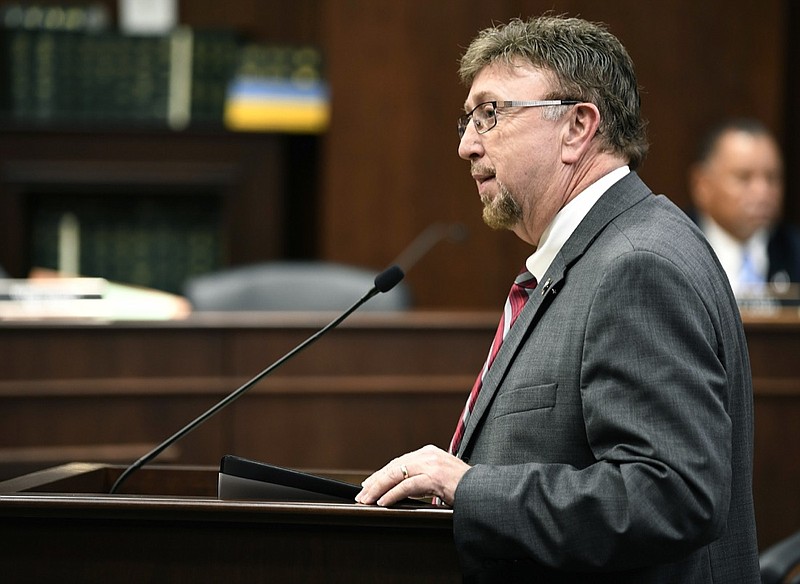NASHVILLE - A Knoxville Democratic lawmaker says she is "pursuing every option available" in her effort to expel Republican Rep. David Byrd from the Tennessee House during Friday's special legislative session.
Rep. Gloria Johnson's comments came after a resolution she filed calling for the chamber to oust the Waynesville Republican was not included on a House calendar.
"I'll absolutely work on every maneuver that's possible," Johnson said of her pre-filed resolution to oust Byrd, a high school teacher and coach accused by three former female basketball players of sexually assaulting them decades ago.
Johnson added "the idea that they're doing everything they can to not do this is reprehensible" and charged "they are protecting a credibly accused child abuser."
Gov. Bill Lee is calling lawmakers into the special session so House representatives can elect Republican Cameron Sexton, of Crossville, as the new speaker.
Sexton will replace former Speaker Glen Casada, R-Franklin, who was forced to resign the post Aug. 2 after a series of scandals that began with sexually explicit and racist text messages exchanged with a top aide.
During the special session, both the House and Senate are also expected to act on another provision included under the scope of Republican Lee's special session call. That involves adopting a revision of state Supreme Court rules.
Johnson had hoped to get her expulsion resolution on a calendar of resolutions typically introduced by lawmakers to honor various people or commemorate events.
Majority Leader William Lamberth, R-Portland, said there are distinct differences between those resolutions, which are considered "non substantive," and what Johnson wants to do.
The resolutions "are honoring an individual" and "do not change the laws of our state, do not change the makeup of the House floor so far as who's serving there," Lamberth, an attorney, noted.
A resolution like Johnson's needs to come through the committee process, Lamberth said. He noted that if a resolution honoring someone on say their 100th birthday had a provision saying it would always be observed, then that's a substantive change in law and would need to come through the committee process.
"Obviously, if you're going to change the laws of Tennessee or change the makeup of who sits on the floor, then that is a much more deliberative process. And it should be," Lamberth said.
Lawmakers hope to spend less than half a day in session and then leave.
"I will note at this point that Rep. Johnson has served in the General Assembly since last November," Lamberth said. "These allegations have been out there since well before that time. She chose not to file any resolution of this nature while the standing committees were actually present during the regular session."
In choosing to file the resolution during a special session, Lamberth said, "It is difficult for us to actually consider this resolution. Just from a sheer procedural standpoint, this is the type of resolution that would ordinarily be filed during the regular session, not a special session that is lasting one day."
But if the recent past is any guide, there is a route Johnson could pursue.
Three years ago this September, the House was called into special session by then-Gov. Bill Haslam to fix a flawed law that threatened to cost the state $60 million in federal funds.
At the same time, the House was embroiled in a controversy over Rep. Jeremy Durham, R-Franklin, who had been accused by 22 women of sexual harassment in an investigation conducted by Tennessee Attorney General Herbert Slatery. Critics of Durham had unsuccessfully tried previously to call themselves into special session to act on Durham.
Then-House Speaker Beth Harwell, R-Nashville, said that while Haslam's special session call was limited to one subject, the "expulsion motion is procedural."
During the special session, Rep. Susan Lynn, R-Mt. Juliet, stood to announce a motion to oust Durham over the sexual misconduct allegations. There was no resolution. But Harwell's House clerk said members could move to oust Durham based on a provision in the Tennessee Constitution.
It grants each chamber the ability to "determine the rules of its proceedings, punish its members for disorderly behavior, and, with the concurrence of two-thirds, expel a member, but not a second time for the same offense; and shall have all other powers necessary for a branch of the Legislature of a free state."
The expulsion motion passed 70-2 - it needed 66 votes - after more than an hour of debate. Durham became the first representative expelled since 1980, and only the second since the Civil War.
Durham is still involved in a federal lawsuit against the state, seeking to obtain health and pension benefits he says have been denied to him.
Johnson, who returned to the House this year after losing her seat in 2014, seemed unaware Tuesday of the circumstances involving Durham's 2016 ouster.
She called it "an interesting motion."
Byrd has never confirmed the allegations made by the three former students over the alleged incidents dating back to the 1980s. But he has never denied them either. And he was recorded in a telephone conversation by one of the former student players a few years ago.
"It's one of those things I've really beaten myself up and I don't know if you believe that or not," Byrd said. "But I do. All the time. There hasn't been a Sunday that's gone by when I'm doing my communion and everything and I'm asking forgiveness for sins, my sins, that's one of the things that I do."
But he never specified what his "sins" had been.
Contact Andy Sher at asher@timesfreepress.com or 615-255-0550. Follow him on Twitter @AndySher1.
